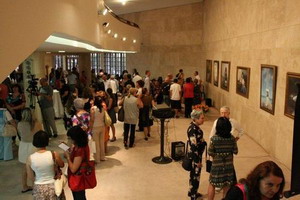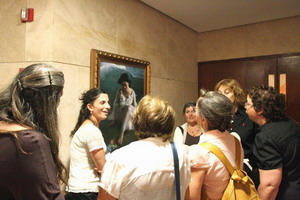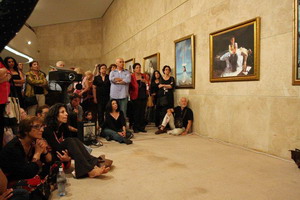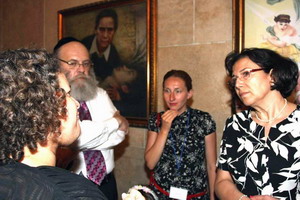(Minghui.org) The Art of Truthfulness-Compassion-Forbearance International Exhibition opened in early June 2012 in one of Israel's most respected theaters, the Opera House Performing Arts Center in Tel Aviv.
The Performing Arts Center is a key part of a cultural complex that includes an opera house, a theater, an art museum, and a large library. The place is very popular among art lovers and attracts many visitors daily.
The exhibition opened during a festive event with many participants and ran for ten days.
The exhibition portrays through realistic oil paintings and traditional Chinese-style paintings the beauty of the Falun Gong spiritual cultivation practice, and its long and brutal persecution at the hands of the Chinese Communist Party in China. The exhibit raises fundamental, universal questions about the meaning and importance of morality in a modern world driven by personal interests and the power of the individual to change, break through boundaries, and overcome difficulties in any situation with faith in goodness.
Falun Gong, also called Falun Dafa, is an ancient Chinese spiritual cultivation practice based on the principles of Truthfulness-Compassion-Forbearance. The artwork in this show was created by Chinese and Western artists that live according to these principles.
On opening night, after words of gratitude and congratulations from the organizers, a letter of congratulations sent for the occasion by the artist and the founder of the exhibition, Professor Zhang Kunlun, was read. The artists greeted the audience and the organizers in Israel and mentioned the following: “...Over time, the principles of Falun Dafa unveil the deepest and most profound truths of the universe. As artists, the practice provides us a righteous path in art creation. We hope you will find the paintings meaningful and inspiring.”
The artists also mentioned the ongoing persecution of Falun Gong, which included some of the artists themselves, “Many artists personally experienced the brutal persecution and were subjected to torture and inhuman treatment in forced labor camps and detention centers. Our artwork reflects our life-threatening experience. We hope it also provides you a glimpse of what is really happening in China.”
After the opening ceremony, visitors were invited to view the artworks, and the exhibition staff provided commentary.
Viewers expressed their deep impression of the art and asked further questions about the paintings, as well as the practice and the present situation in China. Many noted that the exhibition was very important and that it is crucial for more people to learn about it. They also noted the excellent painting techniques.
Many visitors expressed words of thanks for the invitation to the exhibition and said they would recommend it to family and friends.
Tommy Len, one of the guests, said, “As a viewer, I can feel the translation of spirituality; the way the artist expressed it visually. They took something internal and abstract and expressed it in paintings so that people can see it, connect to it. There are two types of paintings in this exhibit. There are those that talk about the spirituality of this cultivation practice, and the other type, very disturbing yet powerful at the same time, show the brutal persecution.”
Jan Greenstein, a photographer and designer who immigrated to Israel from Ukraine and knows from personal experience about life in a communist country, said, “The paintings are excellent, very moving. The idea of communism is not foreign to me, I was born in a communist society. Ukraine in the eighties... I can connect and feel all the pain they went through in China.” In his opinion it is important to present the exhibition to people who have not personally experienced the communist regime. He said, “It is good that the exhibition arrived here, in Israel. It helps people who have not experienced communism to understand what it is all about. The message is very clear. There is a problem in China that needs to be fixed.”
Hadas Nitzan Mandel, an artist who paints in a realistic style, admired both the artistic technique and the content of the paintings, “Every painting has a message. Some of the characters look like they are hovering. It is very interesting that a person's ideals, his attitude, his faith is what makes him rise above it all, and nothing can stop him.”
The exhibition team made contact with primary schools and secondary schools, and with art schools and organizations, and invited them to visit the exhibition. Many did come to view the works.
The curator of the Opera House noted that the opening was impressive, with more participants than usual.
Comments about the exhibition were heard even after the paintings were taken down from the walls of the Performing Arts Center. People called and inquired if it was still possible to view the exhibition, and where would it be displayed next.
Category: Parades & Other Community Events












